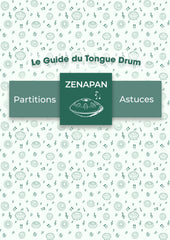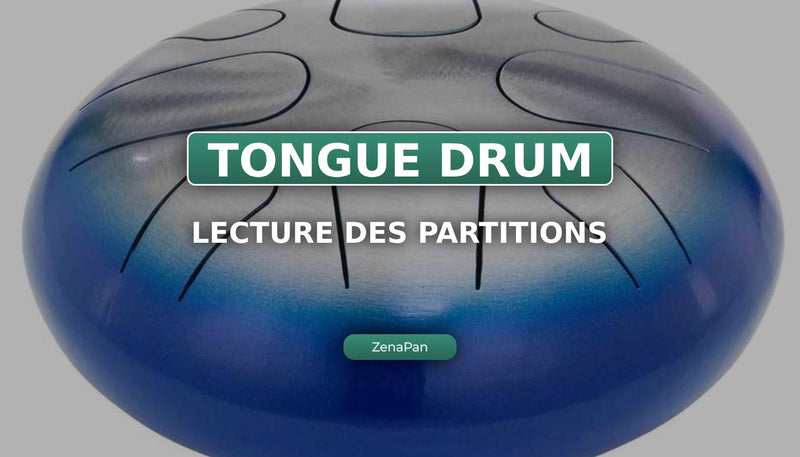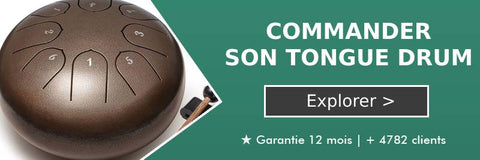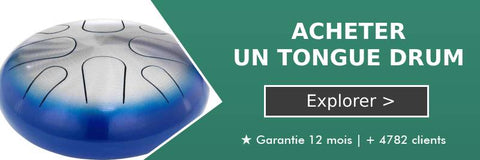Embarking on the journey of learning the tongue drum proves to be an enriching experience, opening the doors to relaxation, serenity and musical awakening. This unique instrument, combining the softness of the tongue drum with the depth of relaxation music , is remarkably accessible, welcoming novice and experienced musicians alike with the same promise of harmony.

This article will reveal essential tips for beginning your musical exploration, whether you are drawn to a wooden tongue drum or the metallic resonance of a steel tongue drum .
Discover how these instruments , from mini models to 432 Hz versions, can transform your approach to music and well-being.
Also read: How to read Tongue Drum Sheet Music correctly?
1. What is a Tongue Drum?
A Tongue Drum is a melodic percussion instrument with blades or " tongues " cut into a metal surface that, when struck, produce sounds. These instruments are known for their soothing sound and can be used for relaxation , meditation , or simply for the enjoyment of playing music .
Experience the sonic magic of the Tongue Drum in action and let yourself be captivated by its soothing melodies through this compilation video for relaxation and meditation selected for you.
Curious to discover more? Dive into our unique collection of tongue drums to complete your musical journey.
2. The basics of learning to play the Tongue Drum
a. Familiarize yourself with the instrument
The first step in learning how to play the tongue drum is to familiarize yourself with the instrument. This includes understanding the layout of the notes and practicing to get the correct sound from the instrument's tongues.
b. Use educational resources
At ZenaPan we offer a range of educational resources to help our customers learn to play the tank drum . Each instrument is sold with a guide that contains tips , tricks and 13 different sheet music . These resources are designed to help you understand the instrument and start playing melodies.

c. Follow video tutorials
In addition to the guide, we also offer 30 video tutorials that demonstrate how to play different pieces on the Tongue Drum. These videos are a great way to visually learn and listen to how each note should sound.
3. Practice regularly
As with any musical instrument, regular practice is essential to progress. Take the time to play every day, even if it's just for a few minutes. Over time, you'll develop a better understanding of the sound of each note and improve your ability to play increasingly complex melodies.
Master the art of tongue drumming with practice and dedication. Explore our diverse collection and find your perfect musical companion for an unforgettable sonic journey.
4. Explore creative music
Once you have mastered the fundamentals, the world of creative music opens up to you with your Steel Tongue Drum . This step in your musical journey is not just an exploration, but an invitation to define your own voice in the sound universe . Experimentation becomes your best tool to discover new musical facets.
- Personal composition
Let your imagination run wild to create unique melodies that reflect your state of mind and creativity. Tongue drum music lends itself wonderfully to this personal exploration.
- Rhythmic variety
Experiment with different rhythms to see how they change the mood and texture of your music. Even a mini tongue drum can produce surprising rhythmic richness.
- Instrumental Collaboration
Incorporate other instruments, such as steel drums or guitar, to enrich your sonic palette. Collaborations can transform a simple melody into a complex and captivating composition.
The key is to stay curious and open to the endless possibilities your instrument offers. Each tongue drum , whether it is a wooden tongue drum or a steel model, carries within it a universe of sounds to explore and personalize. Take advantage of this freedom to express yourself through your tongue drum , exploring its ability to harmonize sounds and tell stories.
5. Comparison: Tongue Drum vs Handpan
| Characteristic | Tongue Drum | Handpan |
|---|---|---|
| Sound | Produces soft, melodic sounds that promote relaxation. | Provides rich, deep resonance, with a wider sound range. |
| Materials | Made of steel or wood. | Mainly made of steel. |
| Ease of learning | Very accessible to beginners, no prior musical knowledge is necessary. | Requires a little more practice to master, but remains accessible to motivated beginners. |
| Portability | Lightweight and easy to carry, ideal for musicians on the move. | Heavier than the tongue drum, but still portable for outdoor performances. |
| Price range | More affordable options available, suitable for tight budgets. | Generally more expensive due to its manufacturing complexity. |
| Use | Perfect for meditation, relaxation, and musical initiation. | Promotes deep musical immersion, ideal for complex performances and compositions. |
To delve deeper into the unique differences between a handpan and a tongue drum, check out our article " What is the Difference Between a Handpan & a Tongue Drum? " and find out which one is right for you!
Conclusion
Learning to play the Steel Tongue Drum is an enriching adventure that opens the door to a meditative and relaxing form of music. At ZenaPan , we are excited to be a part of your musical journey . Our guides, video tutorials, and the ongoing support we offer, will have you making music in no time.
FAQs
1. How long does it take to learn to play the tongue drum?
Learning the basics of tongue drum can take a few hours, but mastering this instrument and its rich sound is an ongoing journey. Regular practice is the key.
2. Do you need any prior musical knowledge to play the tongue drum?
No, the tongue drum is accessible to beginners without any musical experience. Its intuitive approach allows everyone to explore music at their own pace.
3. What is the best tongue drum for a beginner?
A tongue drum with a pentatonic scale is ideal for beginners, as it allows you to play beautiful melodies without complex musical knowledge.
4. Where can I find sheet music for tongue drum?
Tongue drum sheet music is available online, on music websites or community forums. Some manufacturers also provide sheet music books tailored to their models.
5. How to maintain your tongue drum?
Keep your tongue drum away from moisture and extreme temperatures. Clean it regularly with a dry cloth to preserve its sound quality.





